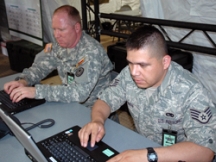Texas National Guard begins clean-up operations in south Texas
Chief Master Sgt. Gonda Moncada And First Sgt. Lek Mateo
2008/07/24
 Sgt. Marc Jones (left) of the Texas Army National Guard’s Standing Joint Interagency Task Force (SJIATF) and Staff Sgt. Gonzalo Roman of Texas Air National Guard 149th Fighter Wing at San Antonio Emergency Operation Center as Hurricane Dolly moves westward towards south Texas Aug. 23. The Category 2 hurricane that is the first of the 2008 Atlantic Hurricane season severely damaged the coastal cities Brownsville and South Padre Island with strong winds and heavy flooding. (Texas Military Forces by First Sgt. Lek Mateo, 100th Mobile Public Affairs Detachment)
Sgt. Marc Jones (left) of the Texas Army National Guard’s Standing Joint Interagency Task Force (SJIATF) and Staff Sgt. Gonzalo Roman of Texas Air National Guard 149th Fighter Wing at San Antonio Emergency Operation Center as Hurricane Dolly moves westward towards south Texas Aug. 23. The Category 2 hurricane that is the first of the 2008 Atlantic Hurricane season severely damaged the coastal cities Brownsville and South Padre Island with strong winds and heavy flooding. (Texas Military Forces by First Sgt. Lek Mateo, 100th Mobile Public Affairs Detachment)
CAMP MABRY, Texas – Dolly may only be a Category I hurricane, but Texas Gov. Rick Perry and the state’s Division of Emergency Management did not take any chances that Dolly would be as harmless as her name might imply.
The governor declared several South Texas counties disaster areas and activated the Texas National Guard to ensure that in the words of Lt. Gen. Charles Rodriguez, the Adjutant General of Texas: “The stuff gets to the people who need it, and people get where they need to be.”
Currently, 600 Guardsmen are activated in support of civil authorities, but that number may increase to 1,200 if necessary. These Guardsmen along with members of the Texas State Guard joined state and local emergency first responders as the first Atlantic hurricane of the 2008 season barreled down on the coast of Texas and Mexico yesterday.
Hurricane Dolly slammed into South Padre Island, Texas at about 1:00 p.m. CST. The Category 1 hurricane brought heavy rain and strong winds of 100 miles-per-hour with gusts estimated to be over 120 miles-per-hour as she swept into the Rio Grande Valley dumping more than 12 inches of rain in some areas.
Today, Guard members are spread out across southern Texas from Austin to Brownsville. The teams are focused initially on establishing mass care strike teams. Texas Guardsmen will go into the affected areas and look for citizens who might need safe passage or re-supply those who are sheltering in place.
Eventually, these same teams will establish stationary points of distribution and co-locate with FEMA at familiar landmarks.
Local incident commanders will dictate what type of support the Texas Guardsmen will provide, but typically personnel will support Red Cross with shelter management, perform search and rescue missions with Texas Task Force One, and provide communications support with “Big Blue,” a full communications package on wheels. Other satellite equipment has also been deployed.
Search and rescue teams are standing by in Kingsville, Texas with about 225 personnel and 75 high profile vehicles from a ground transportation company. Personnel and equipment will move into the affected areas as soon as it safe.
Aviation assets available include three UH60 Blackhawks, in Austin and two in San Antonio, as well as one OH-58. Under an Emergency Management Assistant Compact, the Louisiana Army National Guard also has flown in two Blackhawks to assist where necessary.
State officials took the lessons learned from Hurricane Dean when about 4,700 Guardsmen and State Guard members were mobilized in August 2007 for the Category 5 hurricane, which missed the United States and devastated the coast of northern Mexico.
For Dolly, Guard leaders prestaged personnel, equipment, aircraft and high-water tactical vehicles in Austin, Houston and San Antonio, so that they can quickly be deployed to the impacted areas.
“This is Texas, so our approach is to lean into the problem and stage the necessary personnel, equipment and resources so they can move into the affected area as quickly and efficiently as possible,” Perry said.
Perry commended the Texas military forces, state and local emergency disaster teams who quickly mobilized and responded to the crisis.
“As we always do in the toughest time, we are seeing Texans, being Texans, helping their neighbors, putting others’ needs above their own and heading toward the trouble and not away.”